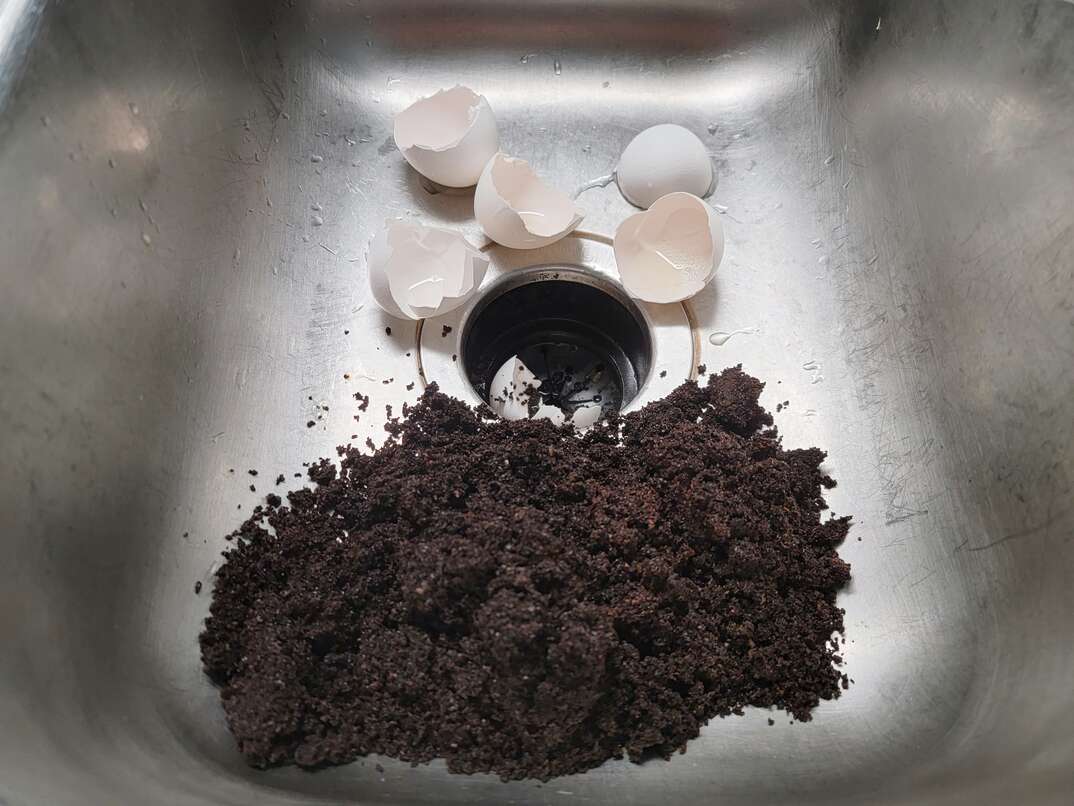Coffee Grounds and 10 Other Things You Should Never Put Down the Garbage Disposal

If you've been throwing all types of food down your garbage disposal without question, you're likely headed for a broken disposal or clogged plumbing lines.
Despite sharp blades and powerful motors, garbage disposals aren't made for every type of food. Many everyday food items can create a major plumbing catastrophe if you put them down the garbage disposal. Learn what not to put in the garbage disposal to save yourself from a large plumbing bill.
Items You Should Never Put Down the Garbage Disposal
The list of things you shouldn't put in a garbage disposal is fairly long. The reasons for avoiding these items vary. Some items clump together or expand, resulting in a clogged plumbing line. Others are hard on the blades and can damage the appliance itself. Either way, disregarding these garbage disposal do’s and don’ts can lead to some serious damage over time.
Here are some items you should never toss down the garbage disposal:
Coffee Grounds
When you pull the coffee grounds out of your coffee maker, they're often clumped together. They'll do the same thing in your plumbing lines, which can create a clog. A few coffee grounds won't likely cause a clog, but lots of grounds can cause issues.
Grease
As fatty remnants of meat and cooking grease cool down, they solidify, which can create a clog in your pipe. Even if you run hot water down the drain with the grease, it can still solidify farther down in the pipe, which could create a problem in municipal lines.
Onion Skins
You typically remove the outer few layers of an onion to get to the good part, but don't toss those skins into the garbage disposal. The thin, papery layers can make it past the blades easily, but they might get lodged in the pipe.
Potato Peels
Potato peels can also slip past the blades, where they can get stuck in the pipe. Other small food particles can get caught up in the peels and make a bigger clog.
Bready and Starchy Items
Items such as bread, rice and oatmeal expand when they get wet. Even if they're already cooked and have expanded during that process, they can expand more in your plumbing system when they soak up more water. A small amount of these expanding foods won't likely cause an issue, but larger amounts should always go in the trash.
Bones
Garbage disposal blades aren't made to grind up extremely hard things like bones. A small chicken or fish bone that slips into the garbage disposal likely won't hurt it, but larger bones can damage the unit.
Fruit Pits and Shells
Like bones, the large, hard pits in things like peaches and avocados are tough on the garbage disposal blades. Seafood shells from oysters and lobsters are also hard on the machine. The softer outer layer of shrimp can move past the blades without getting chopped up and causing a clog.
Nuts
Nuts are also hard, but the garbage disposal can usually chop them up. The problem is the paste that they turn into, much like nut butters you buy at the store. The thick paste can line the inside of the garbage disposal or clump in the drain.
Eggshells
While the eggshells themselves aren't hard enough to do any damage to your garbage disposal, the lining inside the shells can get wrapped around the blades or get stuck in your drainpipes. It's better to put them in the compost pile or trash.
Fibrous Vegetables
Celery, pumpkin, rhubarb, corn husks and other stringy vegetables can get caught up in the blades, especially if they're in long pieces.
Non-Food Items
Avoid putting anything down the garbage disposal that's not food. If a kitchen utensil, piece of packaging or some other item falls into the garbage disposal, turn the unit off immediately and remove the object carefully.
Despite the long list of what not to put in a garbage disposal, there are plenty of other items that you can put in it. Most foods that are soft without expanding when they get wet are safe to put in your garbage disposal. Some examples of things that can go in the garbage disposal include:
- Soft fruit and vegetable scraps
- Cooked meat
- Citrus fruit rinds
- Ice cubes
- Baby food
- Dairy products
- Liquids
- Soft leftovers, unless they contain foods that shouldn't go down the disposal, such as rice
If you're unsure of whether an item is safe in the garbage disposal, opt for the trash can instead. A compost pile is also a safe way to dispose of food scraps while creating a nutrient-rich additive for your garden.
Elocal Editorial Content is for educational and entertainment purposes only. Editorial Content should not be used as a substitute for advice from a licensed professional in your state reviewing your issue. Systems, equipment, issues and circumstances vary. Follow the manufacturer's safety precautions. The opinions, beliefs and viewpoints expressed by the eLocal Editorial Team and other third-party content providers do not necessarily reflect the opinions, beliefs and viewpoints of eLocal or its affiliate companies. Use of the Blog is subject to the
Website Terms and Conditions.The eLocal Editorial Team operates independently of eLocal USA's marketing and sales decisions.



